 Artificial Intelligence in Cardiology Artificial Intelligence in CardiologyOur new review article on artificial intelligence in cardiovascular medicine has been published. The paper outlines methodological foundations and highlights applications in imaging and ECG analysis, including deep learning for functional assessment and disease prediction. It also addresses generative AI, implementation challenges, and ethical considerations. The article is available in German. Learn more |
 Call for applications: 15 PhD candidates Call for applications: 15 PhD candidatesThe TrackAF Doctoral Network, a Horizon Europe Marie Skłodowska-Curie Action focused on atrial cardiomyopathy and atrial fibrillation is recruiting 15 PhD candidates. The network brings together academic, clinical and industrial partners across Europe and offers fully funded, 36-month PhD positions with strong interdisciplinary and international training. If you are interested in pursuing a PhD in a new country, apply by April 12! Learn more |
 OCT-Presentation at Junge Talente – Wissenschaft und Musik OCT-Presentation at Junge Talente – Wissenschaft und MusikAs part of the event series "Junge Talente – Wissenschaft und Musik", Miriam Weiß and Simon Kreutzenberger will present their presentation “OCT: Dem Auge beim Untersuchen anderer Augen helfen” at KIT Campus Nord on February 5. The talk provides a brief introduction to optical coherence tomography (OCT) and its applications in medical imaging. It will be followed by a piano concert featuring students from the Hochschule für Musik Karlsruhe. Mehr erfahren |
 Carpentry Shop 2026 Carpentry Shop 2026In Summer Semester 2026, the IBT will offer the 2-day workshop “Practical Introduction to Research Software Engineering”. The course is worth 1 ECTS and is a hands-on introduction to the Unix shell, the version control system Git, and Python. Learn more |
 Award-Winning Master’s Thesis Award-Winning Master’s ThesisOur Master graduate Carl-Leandro Enslin received this year's Best Thesis Award from the CRC 1173 "Wave Phenomena" for his master’s thesis in IBT's CaMo group, which focused on improving computational models of cardiac electrophysiology and their relation to excitation wave propagation. Learn more |
 DiTraRe Symposium on Digitalisation of Research DiTraRe Symposium on Digitalisation of ResearchOn December 2–3, the very first DiTraRe-Symposium on Digitalisation of Research took place at ZKM Karlsruhe. The event offered two inspiring days full of ideas, exchange, and great energy. Axel and Silvia represented the use case “AI in Biomedical Engineering” within the DiTraRe project, and Silvia also presented a poster on “How Researchers Access Clinical Data”. |
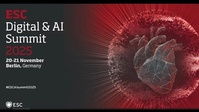 European Society of Cardiology Digital & AI Summit European Society of Cardiology Digital & AI SummitWe presented new advances at the #ESCAIsummit2025 in Berlin. Highlights included a talk on the use of computational heart models to optimize ablation for atrial fibrillation, plus two posters showcasing explainable AI for clinical use and functional atrial digital twins. Learn more |
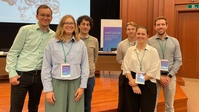 IBT at conferences in Osaka and Kyoto IBT at conferences in Osaka and KyotoIBT has strengthened German-Japanese research cooperation during a recent trip to Japan. The institute visited two important events at the end of October and the beginning of November. Learn more |
 New Research Assistant at the IBT New Research Assistant at the IBTSachin Gunda is working on modeling of cardiac pulsed field ablation Learn more |
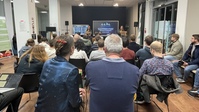 Night of Biosignals Night of BiosignalsOn November 7, the second “Nacht der Biosignale” took place, featuring exciting presentations on the topic of biosignals. Numerous visitors took advantage of the opportunity to attend in person or via livestream. Learn more |
 Awarding of the academic title Senior Professor at KIT Awarding of the academic title Senior Professor at KITWith the awarding of the academic title of Senior Professor at KIT, the KIT recognizes the long-standing commitment and high level of expertise of Professor Olaf Dössel. At the same time, KIT wishes to express its appreciation for outstanding retired professors. The title will be conferred for a three-year term beginning November 1, 2025. |
 New Courses at the IBT New Courses at the IBTStarting in the winter semester, new lectures will be offered at IBT within the study program Biomedical Engineering Master: - Trauma Science – Blood, Emergency Medicine, and Surgery |
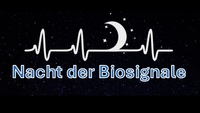 Night of Biosignals 2025 Night of Biosignals 2025On November 7, 2025, the Triangel invites you from 5–10 p.m. to the second “Nacht der Biosignale”, featuring exciting lectures and discussions. The event will be live-streamed and held across 14 locations. Learn more |
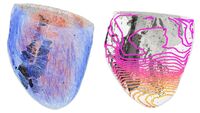 How Fibrosis Disrupts the Heart's Electrical Signals How Fibrosis Disrupts the Heart's Electrical SignalsInnovative imaging technique reveals hidden electrical connections in diseased hearts and provides new therapeutic approaches. Learn more |
 New Interdisciplinary Qualification course: “Practical Introduction to Research Software Engineering” New Interdisciplinary Qualification course: “Practical Introduction to Research Software Engineering”Starting in WS25/26, the Institute of Biomedical Engineering (IBT) will offer the new 2-day workshop “Practical Introduction to Research Software Engineering”. The course is worth 1 ECTS and is a hands-on introduction to the Unix shell, the version control system Git, and Python. More |
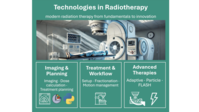 New Master Course “Technologies in Radiotherapy” New Master Course “Technologies in Radiotherapy”Starting in WS25/26, the Institute of Biomedical Engineering (IBT) will offer the new Master course Technologies in Radiotherapy. The course is worth 5 ECTS and combines lectures, excursions, and a hands-on group project. More information |
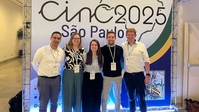 Computing in Cardiology 2025 Computing in Cardiology 2025From September 14–17, our team participated in the Computing in Cardiology (CinC) conference in São Paulo. Axel, Jonathan, Stephanie, and Silvia presented their latest research, contributing to the vibrant exchange of ideas that makes CinC such a unique event. It was an inspiring opportunity to connect with colleagues from around the globe, share knowledge, and spark new collaborations. We’re especially proud of Stephanie, who was recognized as a Young Investigator Award semi-finalist. |
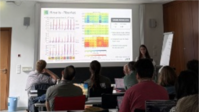 ENUMATH in Heidelberg ENUMATH in HeidelbergWe attended the European Conference on Numerical Mathematics and Advanced Applications in early September. Stephanie Appel presented a 2D benchmark for validating cardiac conduction properties, and Axel Loewe presented on mechano-electric feedback mechanisms. |
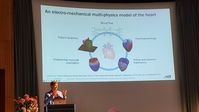 Cardiac Mechano-Electric Coupling (MEC) and Arrhythmias 2025 Cardiac Mechano-Electric Coupling (MEC) and Arrhythmias 2025From September 17 to 20, the 10th International Workshop on Cardiac Mechano-Electric Coupling and Arrhythmias place in Freiburg. Axel Loewe gave a presentation on the differential effects of mechano-electric feedback mechanisms in the whole-heart and Carola Kruthoff presented a poster about her master thesis. |
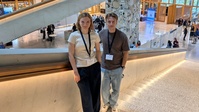 BMT 2025 in Basel BMT 2025 in BaselFrom September 9 to 11, the Tri-National Conference on Biomedical Engineering (BMT) took place in Basel. This event brought together scientists from all areas of medical technology. Carola Kruthoff gave a presentation on the effects of left bundle branch block in an electromechanical heart model and won the student competition, while Julian Mierisch presented a poster on his current research (influence of risk factors for postoperative atrial fibrillation). |
 Clinical consensus on the standardized regionalization of the atria Clinical consensus on the standardized regionalization of the atriaThis new paper presents a clinical consensus statement of the European Heart Rhythm Association and the European Association of Cardiovascular Imaging of the ESC on the standardized regionalization of the atria, with a significant contribution from CaMo IBT. More |
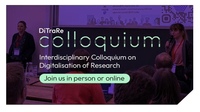 Leibniz-ScienceCampus – Digital Transformation of Research (DiTraRe) Leibniz-ScienceCampus – Digital Transformation of Research (DiTraRe)Join us for our next Colloquium about AI in biomedical engineering! With our special guest - Till Keller, Department of Cardiology and Angiology, Medical Center, University of Freiburg, Bad Krozingen - we will talk about Transformation of Medical Care and Research Based on Digitalisation - Health 4.0. Let's meet in person at the KIT Institute of Biomedical Engineering (IBT) and online on Zoom! |
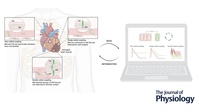 When cardiac cells communicate When cardiac cells communicateA new review article published in The Journal of Physiology explores how non-myocyte cells like fibroblasts and macrophages influence cardiac electrical activity through electrotonic coupling with cardiomyocytes. The study highlights the growing role of computational models in understanding these complex cell–cell interactions across scales, from single cells to the whole heart. This work provides a timely framework for future research into the electrophysiological impact of cardiac heterocellular coupling. More |
 New Research Associate at the IBT New Research Associate at the IBTJule Bender is working on cohort modeling of the human atria for in silico trials. More |
 New Research Associate at the IBT New Research Associate at the IBTCarola Kruthoff is working on the creation and validation of biomechanical twin modeling to unravel the hypertrophic phenotype. More |
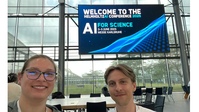 Helmholtz AI Conference 2025 Helmholtz AI Conference 2025Our group recently attended the Helmholtz AI Conference 2025 in Karlsruhe. It was a highly insightful event, emphasizing critical advancements in AI for science, including foundational models, agentic AI, and energy consumption. Silvia and Julian presented their research via posters (PSII-43 and PSII-46), sparking valuable discussions. This conference offered a crucial opportunity to engage with the AI community and gather new perspectives for our work. |
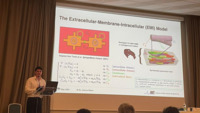 Coupled Problems Conference in Sardinia Coupled Problems Conference in SardiniaFrom 25 to 28 May, the Coupled Problems conference took place in Villasimius, Sardinia. Our institute was represented there by Joshua, who presented a convergence analysis of spatial discretisation for meshes with explicitly represented cardiac cells. The aim was to reduce simulation runtimes based on the Extracellular-Membrane-Intracellular (EMI) model by deliberately coarsening the mesh resolution – without compromising the significance of the results. More |
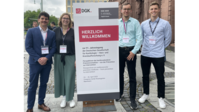 91. DGK – Annual Conference 91. DGK – Annual ConferenceFrom April 23–26, the 91st Annual Meeting of the German Society of Cardiology (DGK) took place in Mannheim. Joshua and Silvia presented posters on their latest research (pacing frequency dependence of cardiac excitation conduction via fibroblasts and non-invasive atrial cardiomyopathy diagnosis), while Christian gave a talk on the automatic division of bi-atrial geometries. Pascal and Axel also attended, connecting with the cardiology research community. |
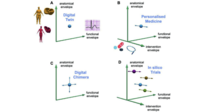 Advances and Challenges in Computational Modelling Advances and Challenges in Computational ModellingSince the turn of the millennium, computational modelling of biological systems has evolved remarkably. The article highlights recent achievements and new challenges, particularly in the cardiovascular system. It emphasizes the importance of mechanistic and data-driven models and their synergies to foster future progress in medical research and artificial intelligence. More |
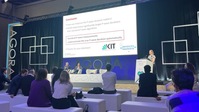 EHRA 2025 in Vienna EHRA 2025 in ViennaFrom March 30 to April 1, the annual meeting of the European Heart Rhythm Association (EHRA) took place, bringing together scientists, healthcare professionals, and key stakeholders from around the world involved in arrhythmia management. Axel Loewe and Silvia Becker represented the IBT at the event. Additionally, Silvia gave a presentation on why it matters how the P-wave is measured in the ECG. More |
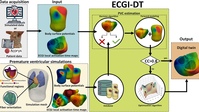 Advancing PVC Localization: A New Approach with ECGI and Digital Twins Advancing PVC Localization: A New Approach with ECGI and Digital TwinsAccurately identifying the origin of premature ventricular contractions (PVCs) is crucial for improving diagnosis and treatment. Read more about this innovative approach led by a collaborative research team, including contributions from CaMo IBT. More |
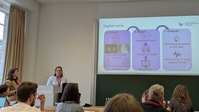 E-Science Days in Heidelberg E-Science Days in HeidelbergFrom March 12 to 14, the E-Science Days took place in Heidelberg with the theme “Research Data Management: Challenges in a Changing World.” Axel Loewe and Silvia Becker represented the IBT in the workshop “Information Infrastructures in the Era of Artificial Intelligence: Opportunities and Challenges,” organized by the Leibniz ScienceCampus DiTraRe. Additionally, Silvia Becker, together with Lea Singson from FIZ Karlsruhe, gave a presentation on the legal aspects of digital twins and synthetic ECGs. More |
 Supercomputers simulate patients' hearts with highly scalable algorithms Supercomputers simulate patients' hearts with highly scalable algorithmsNumerical simulation makes it possible to model very different processes, from the weather to nuclear fusion to individual body organs. This requires highly scalable algorithms that can be put together from a mathematical library like a construction kit. |
 New Insights on Sinoatrial Node Pacemaking Mechanisms New Insights on Sinoatrial Node Pacemaking MechanismsA new paper investigating the interactions between reduced extracellular calcium levels and sympathetic stimulation as a compensatory mechanism, potentially contributing to sudden cardiac death in chronic kidney disease patients, has been published in the Journal of Physiology. More |
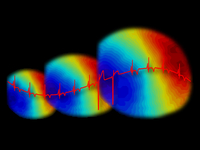 GRS/GRC 2025 in Barga GRS/GRC 2025 in BargaThe Gordon Research Seminar and on Cardiac Arrhythmia Mechanisms was held in Barga from February 22 to 27. It covered a wide range of topics, from atrial and ventricular mechanisms to micro- and ultrastructures of individual cardiac muscle cells. Christian, Moritz, and Axel (on behalf of Tobias) presented their work. More |
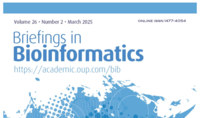 Credibility Assessment of Machine Learning Predictors Credibility Assessment of Machine Learning PredictorsOur recent publication "Consensus Statement on the Credibility Assessment of Machine Learning Predictors" in the journal Briefings in Bioinformatics aims to ensure the reliability and credibility of machine learning models used in clinical and biomedical contexts. Together with other leading experts, we outline a structured framework based on 12 foundational statements and propose rigorous guidelines for evaluating and enhancing the credibility of ML predictors, particularly when used in high-stakes healthcare decisions. More |
 Successful Doctoral Defense: Dr.-Ing. Cristian Barrios Espinosa at KIT Successful Doctoral Defense: Dr.-Ing. Cristian Barrios Espinosa at KITDr.-Ing. Cristian Barrios Espinosa successfully defended his doctoral thesis at KIT, advancing Eikonal-based models to improve the accuracy and efficiency of cardiac electrophysiology simulations. More |
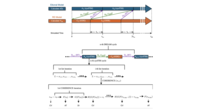 News of DREAM News of DREAMA new paper introduces the latest version of the DREAM for simulating cardiac arrhythmias. Published in Engineering with Computers, it provides an efficient approach to reentry simulations in cardiac electrophysiology. |
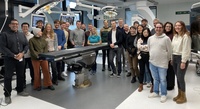 Exploring Innovation in Surgical Technologies Exploring Innovation in Surgical TechnologiesStudents from the Medical Image Processing for Guidance and Navigation course visited Getinge, a global leader in Hybrid Operating Room development. The visit offered valuable insights into advanced surgical technologies and their practical applications in modern healthcare. |
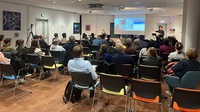 First Nacht der Biosignale First Nacht der BiosignaleOn November 15th, the very first Nacht der Biosignale took place. Simultaneous talks on the fascinating topic of biosignals were held at twelve locations across Germany, including Aachen, Augsburg, Bremen, Dresden, Göttingen, Ilmenau, Jena, Karlsruhe, Kiel, Cologne, Krefeld, and Münster. |
 Helmholtz Software Award for openCARP Helmholtz Software Award for openCARPThe openCARP cardiac electrophysiology simulator openCARP developed by IBT and collaborators won the Helmholtz Software Award in the Newcomer category. The award aims to promote the development of professional and high-quality research software and to recognize the commitment to software as the basis of modern science. |
 Honorary Recognition for Axel Loewe Honorary Recognition for Axel LoeweThe head of the Computational Cardiac Modeling research group has been elected as a Fellow of the European Heart Rhythm Association (FEHRA). This recognizes outstanding contributions to research into cardiac arrhythmias. More |
 A new task for Olaf Dössel and an honor A new task for Olaf Dössel and an honorProf. Dr. Olaf Dössel was elected spokesperson for the health technologies thematic network at acatech. acatech is the German Academy of Engineering Sciences. |
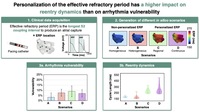 What does it take to build a digital twin of your heart? What does it take to build a digital twin of your heart?Together with researchers from Städtisches Klinikum Karlsruhe and Oxford University, Patricia Martínez and team showed that for atrial arrhythmia prediction, functional measurements make a difference. Incorporating functional personalization into personalize models could improve the ability to stratify patients based on their individual characteristics, leading to more tailored and effective treatment strategies for atrial fibrillation. More |
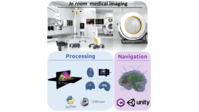 Master Course “Medical Image Processing for guidance and navigation” Master Course “Medical Image Processing for guidance and navigation”A new course for Master Students will be offered since WS 24/25 from IBT lectures. The course, titled “Medical Image Processing for guidance and navigation”, will be worth 9 ECTs for a total of 6 hours per week of lectures/practical exercises plus the accomplishment of a group project. |
 New Research Associate at the IBT New Research Associate at the IBTPascal Maierhofer is working on the validation and improvement of digital twins of the heart for the localization of atrial fibrillation triggers. His focus areas are the application of computer science to medical topics. More |
 DGK Herztage 2024 in Hamburg DGK Herztage 2024 in HamburgFrom September 26 to 28, the DGK Herztage took place in Hamburg – a platform for exchanging the latest insights, innovative solutions, and valuable experiences in the field of cardiology. Christian and Silvia represented the IBT with a poster and two presentations. |
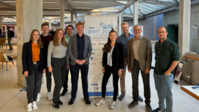 IBT at BMT2024 IBT at BMT2024From September 18 to September 20 the IBT took part at the BMT2024 (“58th Annual Conference of the German Society for Biomedical Engineering) in Stuttgart. Sara Schwab won the second place in the student’s competition. More |
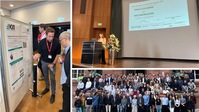 Cardiac Physiome 2024 in Freiburg Cardiac Physiome 2024 in FreiburgThis years Cardiac Physiome Workshop 2024 took place from September 12 to 14, where around 140 researchers engaged on integrating experimental and mathematical approaches to advance cardiac physiology research. In addition to three posters from our group, the contribution of our PhD student Stephanie Appel was selected for a presentation. Our PhD student Jonathan Krauß won the poster award. |
 Computing in Cardiology Conference Computing in Cardiology ConferenceKIT hosted the 51st International Computing in Cardiology Conference in Karlsruhe from September 8-11, welcoming over 500 researchers from all over the world. The experts discussed the latest advances in cardiology research and technology in fields including modeling & simulation, ECG signal processing and artificial intelligence in over 220 presentations and 200 posters. more |
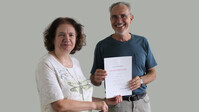 Forty years service anniversary Forty years service anniversaryThe state of Baden-Württemberg would like to thank Irenen Günter for her forty years of service in the public service. The certificate of thanks was presented to her by Professor Werner Nahm in the presence of her colleagues. We wish her all the best for her future endeavors. |
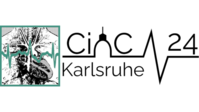 Workshop: Artificial Intelligence for Processing of Biomedical Signals with MATLAB Workshop: Artificial Intelligence for Processing of Biomedical Signals with MATLABOn Sunday September 8, 8:30-11:30am, Mathworks offers a workshop on "Leveraging Artificial Intelligence for Enhanced Processing of Biomedical Signals with MATLAB" on KIT Campus South. Interested participants can find more information and register here. |
 New Research Associate at the IBT New Research Associate at the IBTJulian Mierisch is working on model-informed machine learning for the prediction of postoperative atrial fibrillation and its targeted prevention. His focus areas were Data Science and Software Engineering. More |
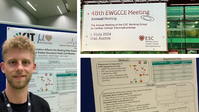 EWGCCE 2024 in Graz EWGCCE 2024 in GrazThe 48th conference of the ESC Working Group on Cardiac Cellular Electrophysiology took place in Graz from July 1 to 3. The focus was on the influence of the autonomic nervous system on heart rate and arrhythmias, compartmentalisation within cardiac myocytes and the latest experimental findings on iPSC cardiac myocytes. Moritz took the opportunity to present his work on the influence of the autonomic nervous system in sinoatrial node cell models. |
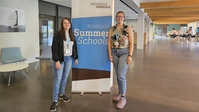 Summer School Bordeaux - Cardiac electrophysiology Summer School Bordeaux - Cardiac electrophysiologyFrom June 17th to June 21st, Stephanie and Silvia attended the Summer School in Bordeaux to deepen their knowledge of cardiac electrophysiology. Engaging lectures and an interactive lab tour at Liryc made this week a remarkable experience. |
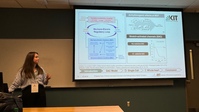 IBT at 8th CMBE IBT at 8th CMBEFrom June 24 to June 26, the 8th International Conference on Computational and Mathematical Biomedical Engineering (CMBE) took place at the George Mason University in Arlington, Virginia. Our PhD student Stephanie was there to present our work on exploring the potential role of stretch-activated channels in the pathogenesis of atrial fibrillation in a mini-symposium on innovative computational models and methods for the cardiac function. More |
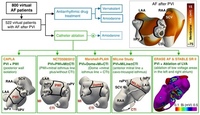 i-STRATIFICATION study examines 800 virtual patients i-STRATIFICATION study examines 800 virtual patientsIn this study by Oxford University and KIT, various therapies were systematically investigated in 800 virtual patients with atrial fibrillation. The study aims to assign patients in whom pulmonary vein isolation was not successful as an initial therapy to optimal pharmacological and ablation therapies on the basis of in-silico tests. Treatment strategies vary depending on atrial size and the presence of low-voltage areas. In-silico models are a promising tool for individual therapy optimization in atrial fibrillation. More |
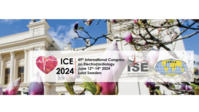 IBT at the International Congress on Electrocardiology IBT at the International Congress on ElectrocardiologyThe 49th edition of the International Congress on Electrocardiology, jointly organized by ISE and ISHNE, was held in Lund, Sweden in June. Axel Loewe presented research at the intersection of mechanistic modeling and machine learning to the mixed clinical/technical audience. As this year marks the centennial of Einthoven's Nobel Prize for the electrocardiogram (ECG), the conference was a perfect occasion to celebrate this invention that remains of utmost relevance for clinical practice and is poised to be propelled to new heights with the advent of artificial intelligence. More |
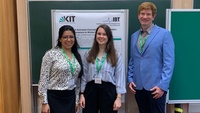 Fickle Heart Workshop 2024 Fickle Heart Workshop 2024From June 2 to June 4, the Fickle Heart Workshop took place at the Isaac Newton Institute of Mathematical Science in Cambridge, focusing on digital twins, artificial intelligence and uncertainty quantification tools for calibration and forecasting. Axel, Patricia and Stephanie took the opportunity of this workshop to present their work in this field. More |
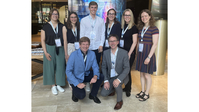 IBT at the Atrial Signals conference in Maastricht IBT at the Atrial Signals conference in MaastrichtFrom June 6th to 8th, IBT attended the Atrial Signals Conference in Maastricht. In addition to 4 poster presentations by our PhD students, Axel Loewe presented his visions for the future of computational models of the heart in atrial fibrillation research. More |
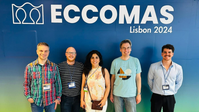 IBT at ECCOMAS conference 2024 IBT at ECCOMAS conference 2024In this year’s European Community on Computational Methods in Applied Sciences (ECCOMAS) conference in Lisbon, our PhD student Joshua Steyer presented his results on electrograms in a cell-to-cell cardiac model within the "Computational Cardiology: Modeling and Simulating the Heart" mini-symposium. More |
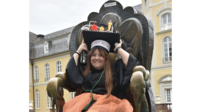 Carmen Martínez Antón, PhD Carmen Martínez Antón, PhDCarmen Martínez Antón successfully defended her PhD thesis „Local Impedance Characterization for Scar and Fibrosis Detection – Towards a New Substrate Assessment for Atrial Mapping” on April 25th 2024. Our heartfelt congratulations! More |
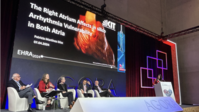 IBT present at DGK and EHRA 2024 Conferences IBT present at DGK and EHRA 2024 ConferencesDuring April the conference of the German society of cardiology (DGK) and the European Heart Rhythm Association (EHRA) took place bringing together cardiologists from Germany and around the world. On the 7th-9th The European Heart Rhythm Association (EHRA) conference took place in Berlin. Our PhD student Patricia Martínez was nominated for the Young Investigator Award in the Basic and Translational Science category and presented her work on the effects of right atrial arrhythmia susceptibility in patient-specific computer models. More |
 IBT at the GAMM annual meeting 2024 IBT at the GAMM annual meeting 2024From March 18 to March 22, 2024 the 94th annual meeting of the GAMM (Association of Applied Mathematics and Mechanics) took place in Magdeburg at the Otto von Guericke university. Our PhD student Jonathan Krauß presented a comparison of different pericardium modeling approaches. More |
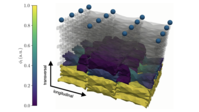 IBT at Biosignals Workshop Göttingen IBT at Biosignals Workshop GöttingenIn this year’s Biosignals Workshop in Göttingen, we presented our work on electrograms in a cell-by-cell model. We have shown that healthy excitation propagation, as opposed to what we would expect in homogenised models, yields asymmetric electrograms exhibiting several small deflections. These deflections, in turn, can be explained by the multimodality of cell activation as well as the deceleration of the excitation wave when transitioning between two cardiac cells. More |
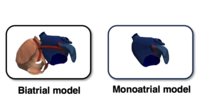 The right atrium affects in silico arrhythmia vulnerability in both atria The right atrium affects in silico arrhythmia vulnerability in both atriaWhat influence does the inclusion of the right atrium have on the assessment of arrhythmia susceptibility in patient-specific computer models? In this study, we investigated differences in arrhythmia susceptibility between monoatrial and biatrial models. Our results suggest that inclusion of the right atrium increases inducibility in the model and also shows a state-dependent influence on arrhythmia dynamics. More |
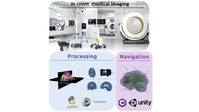 New Master Course “Medical Image Processing for guidance and navigation” New Master Course “Medical Image Processing for guidance and navigation”A new course for Master Students will be offered since SS24 from IBT lectures. The course, titled “Medical Image Processing for guidance and navigation”, will be worth 6 ECTs for a total of 4 hours per week of lectures/practical exercises plus the accomplishment of a group project. |
 Software Carpentry Workshop at KIT Software Carpentry Workshop at KITOn March 19th and 20th 2024, the Institute of Biomedical Engineering is hosting an in person Software Carpentry workshop, primarily open to graduate students and research staff at KIT. More |
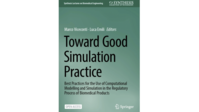 Toward Good Simulation Practice Toward Good Simulation PracticeThis open access book has brought together 138 experts in In Silico Trials working in academia, the medical industry, regulatory bodies, hospitals, and consulting firms. Through a consensus process, these experts produced the first attempt to define some Good Simulation Practices on how to develop, evaluate, and use In Silico Trials. Good Simulation Practice constitutes an indispensable guide for anyone who is planning to engage at any title with In Silico Trials. IBT researcher Axel Loewe has co-edited the chapters Model Development and The Investigator: Modellers and Analysts. More |
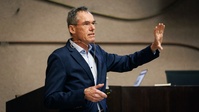 KIT HealthTech at City Hall KIT HealthTech at City HallOn January 29, the KIT Center for Health Technologies presented itself to the Karlsruhe city society in the city hall. KIT Distinguished Senior Fellow Prof. Dössel gave a lecture on "Artificial Intelligence and Machine Learning in Medicine". More |
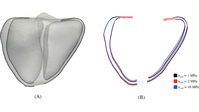 Numerical evaluation of (electro-)mechanic cardiac models Numerical evaluation of (electro-)mechanic cardiac modelsTogether with our collaborators at the Institute for Applied and Numerical Mathematics, we investigated the impact of modeling choices such as mesh size, incompressibility constraint, active strain or active stress as well as the choice of the damping scheme. Click here to learn about our findings: https://onlinelibrary.wiley.com/doi/10.1002/gamm.202370010 More |
 New Research Associate at the IBT New Research Associate at the IBTThe Institute of Biomedical Engineering welcomes Silvia Becker as a new research associate. Since January 2024, she has been working on the analysis of ECG data using machine learning within the “Computational Cardiac Modeling” research group. |
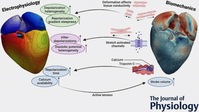 Differential effects of mechano-electric feedback mechanisms on whole-heart activation, repolarization, and tension Differential effects of mechano-electric feedback mechanisms on whole-heart activation, repolarization, and tensionWhich effects does the mechanical activation of the heart cause on the electrical control of cardiac rhythm and excitation? Using the fully coupled electro-mechanical computer model of the heart developed at IBT, we showed that mechano-electric feedback changes activation and repolarization patterns throughout the heart during sinus rhythm and leads to a markedly more heterogeneous electrophysiological substrate. Read the full study published open access in The Journal of Physiology. More |
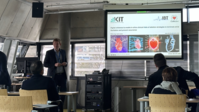 RICAM Workshop Mathematical Methods in Medicine RICAM Workshop Mathematical Methods in MedicineFrom November 28th until December 1st took place in Linz the Workshop in modeling and simulation of ablation therapies in medicine at the Johann Radon Institute for Computational and Applied Mathematics (RICAM) of the Austrian Academy of Sciences. During the week, our scientist Axel Loewe and Carmen Martinez had the opportunity to present their work and meet other successful researchers in the field. |
 Visiting Professor at IBT Visiting Professor at IBTProf. Elena De Momi, from Politecnico di Milano University (Italy), hasVisiting Professor at IBT |
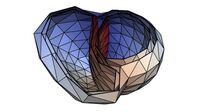 KIT Podcast: Localization through AI KIT Podcast: Localization through AIA research project at the Karlsruhe Institute of Technology relies on artificial intelligence to localize the origin of heart palpitations based solely on a standard ECGS.
To KIT Campus Report Podcast (German) More |
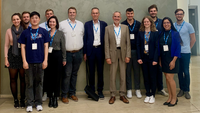 IBT at BMT2023 IBT at BMT2023From September 26 to September 28 the IBT took part at the BMT2023 (“57th Annual Conference of the German Society for Biomedical Engineering) in Duisburg. Christian Götz won the first place in the student’s competition and Laura Unger was honored with the first prize in the Klee Award for her PhD thesis. More |
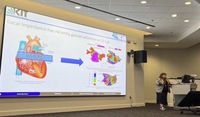 CinC 2023 CinC 2023With five members and three former members of our Cardiac Modeling Group, we participated in this year’s 50thedition of the Computing in Cardiology conference in Atlanta, USA which took place from October 1st to 4th. After the Sunday symposium of the conference, which put special attention on the impact of racism and sexism on health, we presented some of our most recent results. We are proud of Carmen Martínez who was awarded as a semi-finalist of the Young Investigator Award and our former visitor Albert Dasí who made it to the finalists. Congrats, Carmen and Albert! We are looking forward to hosting the 51st edition of the CinC next year in Karlsruhe. More |
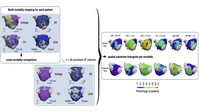 Multi-modal substrate characterization to guide atrial-fibrillation treatment Multi-modal substrate characterization to guide atrial-fibrillation treatmentTogether with clinicians in Freiburg and industrial partners in Barcelona, we analyzed differences in atrial substrate localization using late gadolinium enhancement-magnetic resonance imaging (LGE-MRI), electrogram voltage, and conduction velocity. A newly proposed LGE-MRI analysis method increases coherence but discordances exist. More |
 Presentation at the 10th International Conference on Computational Bioengineering Presentation at the 10th International Conference on Computational BioengineeringFrom September 20-22, 2023, the 10th edition of this international conference was held in Vienna, Austria. The IBT was represented with a presentation on Electro-mechanical modeling and simulation of the human heart in the mini-symposium Continuum biomechanics of active biological systems. More |
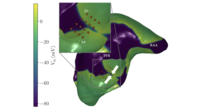 Simulated Cardiac Excitation Patterns and Their Electrograms Simulated Cardiac Excitation Patterns and Their ElectrogramsAs a contribution to the FIMH conference, using simulations, we investigated abnormal excitation patterns in the atrium and their electrograms. In contrast to existing studies, we here considered the curvature, different wall thicknesses, as well as electric heterogeneity in a realistic right-atrial geometry. More |
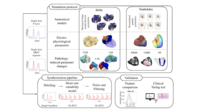 Large synthetic ECG dataset for machine learning Large synthetic ECG dataset for machine learningTogether with researchers from the Medical University of Graz, PTB Berlin and King's College London, we have published a dataset of 16,900 synthetic ECGs. The ECGs have been generated by detailed computer simulations that allow each ECG signal to be traced back to unique model parameters with biological meaning. More |
 Machine learning: Artificial neural networks localize heart palpitations Machine learning: Artificial neural networks localize heart palpitationsExtra heartbeats from the main chambers of the heart, so-called ventricular extrasystoles, can be related to serious diseases. Researchers at the Karlsruhe Institute of Technology (KIT) use machine learning to determine the origin of the extrasystoles non-invasively. More |
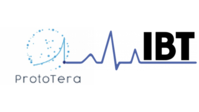 IBT-Prototera agreement for PhD fellowships IBT-Prototera agreement for PhD fellowshipsThe IBT and Prototera Association (Portugal) established an agreement for 4-year PhD fellowships funded by the Portuguese Government. Students who are interested in doctoral research projects in the field of Image Guidance in Proton Therapy can contact Prof. Francesca Spadea mf.spadea@kit.edu. The 4 year project will be conducted in joint collaboration with the University “Instituto Superior Técnico” of Lisbon. More |
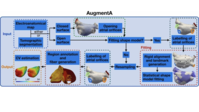 Pipeline for creating digital twins of the heart Pipeline for creating digital twins of the heartOur latest paper describes a methodology to generate anatomical and functional atrial digital twins personalized models from imaging data and/or electroanatomical maps. The reproducible and automated framework processes geometries derived from clinical data. More |
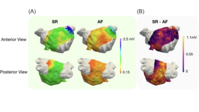 Ablation also possible during atrial fibrillation? Ablation also possible during atrial fibrillation?Together with physicians from the University Heart Center Freiburg Bad Krozingen, we compared whether substrate underlying atrial fibrillation can be localized not only in sinus rhythm but also during atrial fibrillation. The moderate agreement suggests to perform the investigation in sinus rhythm. More |
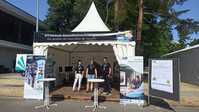 KIT Open Day KIT Open DayThe IBT was represented in the tent of the new KIT Center Health Technologies at the Open Day and was happy to welcome many of the about 25,000 visitors about personalized and digital medicine, optical methods in medicine as well as the study course medical engineering. Mehr |
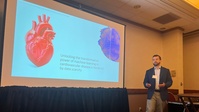 IBT at the 2023 SIAM Conference on Dynamical Systems IBT at the 2023 SIAM Conference on Dynamical SystemsAt the SIAM Conference in Portland, Cristian Barrios Espinosa presented research on advancing machine learning methods in cardiology. Discover more about the diverse applications of dynamical systems in medicine. Mehr |
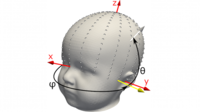 CNN-based classification approach for craniosynostosis published CNN-based classification approach for craniosynostosis publishedIn cooperation with researchers from the Institute for Medical Informatics and Oral and Maxillofacial Surgery at Heidelberg University Hospital, IBT employees have developed a method to display the 3D geometry of the head as 2D images, which enables a CNN-based classification of head deformities. More |
 5th international openCARP user meeting in Karlsruhe 5th international openCARP user meeting in KarlsruheFrom May 24-26, we could welcome around 60 international guests in Karlsruhe for the 5th openCARP user meeting. The fully booked workshop offered training and discussion formats for both new users and experts. More |
 Klee Award 2023 presented to Dr.-Ing. Laura Anna Unger Klee Award 2023 presented to Dr.-Ing. Laura Anna UngerThe foundation Familie Klee and the German Society for Biomedical Engineering (DGBMT) within the Association for Electrical, Electronic & Information Technologies (VDE) annually give out an award for practically oriented research and development in medical technology. This year’s jury chose Dr.-Ing. Laura Anna Unger and her dissertation on multimodal characterization of the atrial substrate as the winner. Completed with honors at IBT in 2022, the particularly intense collaboration with cardiologists contributed significantly to the success of the project. More |
 New Research Associate at the IBT New Research Associate at the IBTThe Institute of Biomedical Engineering welcomes Mr. Moritz Linder as a new research associate. Moritz Linder completed a master's degree in mechatronics and information technology at the KIT. More |
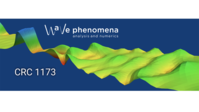 4 more years of research on wave phenomena 4 more years of research on wave phenomenaThe German Research Foundation (DFG) funds the Collaborative Research Center "Wave Phenomena" for 4 more years after intensive review. We are happy to contribute with the use case propagation waves in the heart! More |
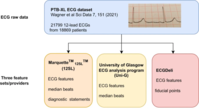 ECG dataset for machine learning published ECG dataset for machine learning publishedClassic machine learning methods require the pre-processing of ECG signals. Together with researchers from the University of Oldenburg, PTB Berlin, Aalborg University and Charité Berlin, among others, IBT researchers have recently published annotations of more than 20,000 ECGs. For this, also signal processing algorithms developed at the IBT were used. More |
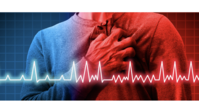 Atrial fibrillation: Technology for diagnosis, monitoring and therapy Atrial fibrillation: Technology for diagnosis, monitoring and therapyThe recently published 2nd edition of the special issue of the journal Frontiers in Physiology highlights the latest developments for technology to diagnose, monitor and treat atrial fibrillation. The collection of 16 articles is co-edited by IBT researcher Axel Loewe. More |
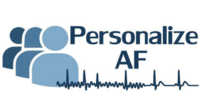 PersonalizeAF Consortium Meeting at KIT PersonalizeAF Consortium Meeting at KITAt the beginning of May, we had the pleasure to welcome about 30 researchers from all over Europe at KIT, who are working on the improvement of diagnosis and therapy of atrial fibrillation in the European PersonalizeAF project. After two days of "Career Opportunities Workshop" for the 15 PhD students, the focus of the last two days was on the exchange of latest research results. More |
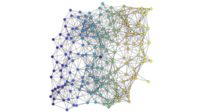 Topological Analysis of 2D Cell Networks Topological Analysis of 2D Cell NetworksAssessing the radiosensitivity of tumoral cells is of paramount importance for understanding the efficacy of radiotherapy treatments and design the proper dose delivery scheme. In this work we showed that the topology of 2D cancer-cell graphs is influenced by ionizing radiation and can be capture by microscopy mage analysis. More |
 EHRA Conference 2023 EHRA Conference 2023The European Heart Rhythm Association (EHRA) conference took place in Barcelona on April 16-18, 2023 at its 20th anniversary. Our PhD student Patricia Martínez was nominated for a Young Investigator Award in Clinical and Translational Science. More |
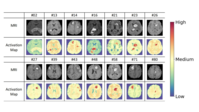 Deep learning PCNSL Deep learning PCNSLFollowing our previous Radiomics based study, we tailored a Deep Learning (3D ResNet) to predict the Overall Survival of patients with PCNSL. The aim was to overcome the limitation of feature selection and engineering by self-learning relevant image features. Gradient-weighted class activation mapping was applied to interpret the results. To the published article |
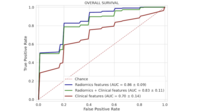 Radiomics and Machine Learning for prognosis in rare tumors Radiomics and Machine Learning for prognosis in rare tumorsIn collaboration with University Magna Graecia (Italy), Politecnico di Milano (Italy) and our Clinical Partner at San Raffaele Hospital of Milan (Italy), we proved that the prognostic value of radiomics features extracted from MR images of PCNSL patients overcomes the current prediction model based on clinical features. These results pave the way for further investigations on the potential role of image features to drive treatment choice. More |
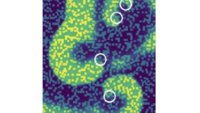 What’s the role of pulse timing in cardiac defibrillation? What’s the role of pulse timing in cardiac defibrillation?In collaboration with the Biomedical Physics group at the MPI for Dynamics and Self-Organization, we investigated time series of the success rates for cardiac defibrillation. Using a simplified 2D model for chaotic excitation dynamics, we got some interesting insights, especially for the success of low-energy pulses. More |
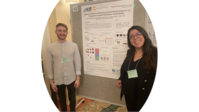 Gordon Research Conference 2023: memories from the space city Gordon Research Conference 2023: memories from the space cityLast week the Gordon Research Conference (GRC) on Cardiac Arrhythmia Mechanisms was held in Galveston (Texas, USA). Patricia Martínez and Albert Dasí won first prize in the student poster competition. More |
 Podcast on atrial fibrillation research in Karlsruhe Podcast on atrial fibrillation research in KarlsruheIn the latest episode of the Signals for Life podcast of the German Society for Biomedical Engineering (DGBMT) in the VDE, Laura Unger from IBT and Armin Luik from the Karlsruhe Municipal Hospital present their joint research on atrial fibrillation. Another episode will follow soon! More (in German) |
 Software Carpentry Workshop at KIT Software Carpentry Workshop at KITOn March 29th and 30th 2023, the Institute of Biomedical Engineering is hosting a workshop which aims to teach foundational coding to researchers, open to registration for all KIT members. More |
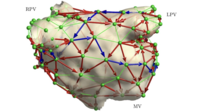 Recommender system for ablation lines of atrial tachycardia Recommender system for ablation lines of atrial tachycardiaTogether with researchers from the Università degli Studi di Milano and the Municipal Hospital Karlsruhe, we present a recommendation system for the ablation treatment of atrial flutter. Based on graph theoretic methods, the optimal configuration of the ablation scars to be applied is automatically determined with the help of optimization algorithms. More |
 New Professor at IBT New Professor at IBTOn January 1, 2023, Prof. Maria Francesca Spadea took over the professorship for modeling and simulation in medical technology at the Institute of Biomedical Engineering. More |
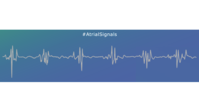 Special Issue Atrial Signals Special Issue Atrial SignalsWith the title "Together we are strong! Collaboration between clinicians and engineers as an enabler for better diagnosis and therapy of atrial arrhythmias", a special issue of the journal "Medical & Biological Engineering & Computing" was published that contains works presented at the Atrial Signals conference in Karlsruhe. The editorial furthermore highlights the lifework of Olaf Dössel and Claus Schmitt. More |
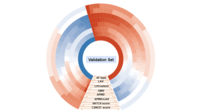 What distinguishes different types of atrial fibrillation? What distinguishes different types of atrial fibrillation?While good treatment options exist for paroxysmal atrial fibrillation, persistent atrial fibrillation still cannot be treated satisfactorily. Together with researchers from the University Heart Center Freiburg Bad Krozingen, anatomical and functional differences between these two types have now been identified, which may form the basis for future tailored therapeutic approaches. More |
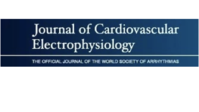 Commentary in the Journal of Cardiovascular Electrophysiology Commentary in the Journal of Cardiovascular ElectrophysiologyIn an invited editorial, Axel Loewe (IBT) and Amir Jadidi (University Heart Center Freiburg Bad Krozingen) discuss the recent article by Boyle et al. in the Journal of Cardiovascular Electrophysiology on predicting the success of pulmonary vein isolation using magnetic resonance imaging. More |
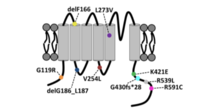 Functional characterization of genetic mutations Functional characterization of genetic mutationsTogether with researchers from Marburg, Munich, Frankfurt, the effect of a new group of genetic mutations on cardiac electrophysiology was investigated. The study was published open access in the special isse "Molecular Effects of Mutations in Human Genetic Diseases" of the "International Journal of Molecular Sciences". More |
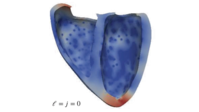 Comparison of numerical methods to simulate the heart Comparison of numerical methods to simulate the heartHow do different numerical splitting schemes for solving the monodomain equation of cardiac electrophysiology compare in terms of convergence, accuracy and efficiency? We answer this question collaboratively with mathematicians (CRC 1173 - Wave phenomena) in a study published in the "International Journal of Numerical Methods in Biomedical Engineering". More |
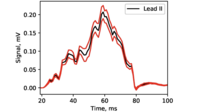 Uncertainty quantification for ECG simulations Uncertainty quantification for ECG simulationsTogether with researchers from the PTB in Berlin, we systematically studied the influence of uncertainty in the input parameters of multiscale heart simulations on the resulting ECG. The work is published open access in the journal "Metrology". More |
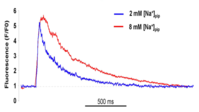 How important is the reverse mode of the sodium-calcium exchanger? How important is the reverse mode of the sodium-calcium exchanger?Together with a team from the University of Szeged, IBT researchers have studied the reverse mode of the sodium-calcium exchanger for the function of the sinus node, the natural pacemaker of the heart. By combining biological experiments and computer simulations, evidence for a crucial role could be demonstrated. More |
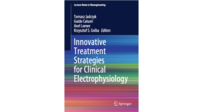 Book "Innovative Treatment Strategies for Clinical Electrophysiology" Book "Innovative Treatment Strategies for Clinical Electrophysiology"With contributions of IBT as coeditor and authors of two chapters on machine learning in cardiac electrophysiology and cardiac digital twin modeling, the book was published in the series Lecture Notes in Bioengineering of the Springer publishing house. Mehr |
 Oxford Symposium on the Future of Therapy Discovery and Development Oxford Symposium on the Future of Therapy Discovery and DevelopmentTogether with the National Centre for the Replacement, Refinement and Reduction of Animals in Research, the University of Oxford held a symposium on Dec 5 and 6. IBT and its clinical collaborators from Freiburg University presented their work and views on the synergy between computational modeling and machine learning and its clinical translation. |
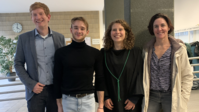 Claudia Nagel, PhD Claudia Nagel, PhDClaudia Nagel successfully defended her PhD thesis „Multiscale Cohort Modeling of Atrial Electrophysiology - Risk Stratification for Atrial Fibrillation through Machine Learning on Electrocardiograms“ on November 17th, 2022. Our heartfelt congratulations! PhD thesis |
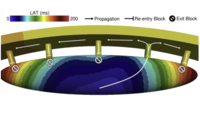 What makes our heart beat? What makes our heart beat?IBT researchers present the first functional 3D computer model of the human sinus node in the renowned Biophysical Journal. |
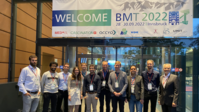 IBT at BMT2022 IBT at BMT2022From September 28 to September 30 the IBT took part at BMT2022 ("Joint Annual Conference of the Austrian, German and Swiss Societies for Biomedical Engineering") in Innsbruck. 3 students and 4 PhDs were responsible for 5 presentations and 2 posters in total. Jule Bender won second place in the student's competition for her paper "A Large-Scale Virtual Patient Cohort to Study ECG Features of Interatrial Conduction Block". Congratulations! |
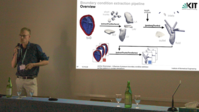 „Modeling the Cardiac Function“ Conferece „Modeling the Cardiac Function“ ConfereceThe „Modeling the Cardiac Function“ conference hosted by the iHeart project took place in Cetraro from 30.9 to 2.10. An IBT member was there and presented our studies on the influence of boundary conditions on fluid dynamics simulations. More |
 CinC 2022 CinC 2022The 49th edition of Computing in Cardiology (CinC) took place in Tampere, Finland from 04-07 Sep, 2022. 5 current PhD students from the IBT as well as Albert Dasí who is visiting our lab presented their recent work. Carmen Martínez was recognized as a semi-finalist for the Young Investigators Award and former postdoc Jorge Sánchez took home the Poster Award for the work he did while still at the IBT. Congratulations, Carmen and Jorge! More |
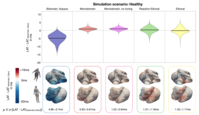 Comparison of propagation models and forward calculation methods in atrial electrophysiology Comparison of propagation models and forward calculation methods in atrial electrophysiologyIBT members and collaborators from the Medical University of Graz investigated if and to what extent simplified methods and models can yield physiologically accurate results in electrophysiological atrial simulations regarding activation times and electrocardiograms (ECG) while reducing computational cost markedly at the same time. These analyses form the basis for extensive ECG-based simulation studies to e.g., generate large-scale datasets for machine learning approaches. More |
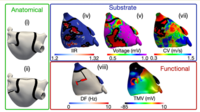 Which strategy for ablating atrial fibrillation works best? Which strategy for ablating atrial fibrillation works best?IBT researchers, together with the University Hospital of Freiburg, have systematically compared different therapeutic approaches in a cohort of 29 digital twins of atrial fibrillation patients. They were able to show that precise identification of tissue changes is crucial. Personalized computer models can help to achieve the optimal therapeutic success with the smallest possible intervention. More |
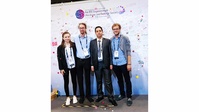 EMBC 22 EMBC 2244th International Engineering in Medicine and Biology Conference (EMBC) was held in Glasgow, Scotland, from 11-15 July 2022. |
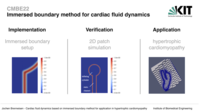 Computational and Mathematical Biomedical Engineering Conference Computational and Mathematical Biomedical Engineering ConferenceThis year’s Computational and Mathematical Biomedical Engineering Conference (CMBE22) was hosted by the Politecnico di Milano (Italy) from June 27th to 29th. Jochen Brenneisen presented the latest studies on the Immersed Boundary Method to simulate fluid dynamics in the heart. It was a great conference with highly interesting presentations and fruitful discussions. Conference proceedings will follow soon on https://www.compbiomed.net/2021/ Mehr |
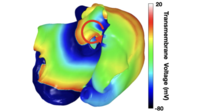 IBT research featured in "AI in Healthcare Highlights & Milestones" report 3/22 IBT research featured in "AI in Healthcare Highlights & Milestones" report 3/22 |
 Klee Prize for Giorgio Luongo Klee Prize for Giorgio LuongoThe German Society for Biomedical Engineering (DGBMT) annually awards the Klee Prize to scientists for practical developments in the field of medical technology. Giorgio Luongo was awarded 3rd place for his dissertation "Non-Invasive Atrial Arrhythmia Diagnosis Using the 12-Lead ECG: Machine Learning Leveraging in-silico and Clinical Signals" at IBT. |
 Prof. Olaf Dössel was honored for his outstanding scientific achievements in the faculty council Prof. Olaf Dössel was honored for his outstanding scientific achievements in the faculty councilThe wish and application of the division and faculty management to appoint the recently retired Prof. Dössel as a Distinguished Senior Fellow was positively approved by the KIT. Prof. Dössel is involved, among other things, in 3 academies of science and in international professional societies as well as an expert in his field of medical technology. |
 New research assistant at IBT New research assistant at IBTAs of June 2022, the IBT welcomes Joshua Steyer as a new research assistant within the „Computational Cardiac Modelling“ group. In the scope of the MICROCARD research project, he will investigate the effect of microscopic tissue structure on clinical electrograms using HPC simulations for an improved assessment of the vulnerability to arrhythmias and tailored ablation strategies. He studied physics and numerically analyzed spatiotemporally chaotic excitation dynamics of the heart during his Master’s thesis at the MPI for Dynamics and Self-Organization. More |
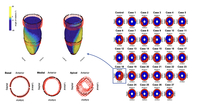 Is electromechanical tissue coupling a determinant for altered left ventricular rotation patterns? Is electromechanical tissue coupling a determinant for altered left ventricular rotation patterns?In cooperation with physicians from the St. Anne’s University Hospital, Brno, researchers at IBT showed that a dyssynchronous activation of the left ventricle is insufficient to result in a breakdown of the typical torsional contraction pattern in patients diagnosed with heart failure. More |
 Graduation Tobias Gerach Graduation Tobias GerachTobias Gerach successfully defended his dissertation „ Personalized Electromechanical Modeling of the Human Heart - Challenges and Opportunities in Pathophysiological Scenarios “ on May 19th 2022 and passed the doctoral exam with distinction. Sincere congratulations to our new PhD from the team’s whole heart! |
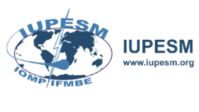 Tribute for Prof. Em. Olaf Dössel Tribute for Prof. Em. Olaf DösselOlaf Dössel was appointed Fellow of the International Union for Physical and Engineering Sciences in Medicine (IUPESM) in recognition of his outstanding contribution to the international development of physical and engineering sciences in medicine. |
 DGK Annual Meeting DGK Annual MeetingThe 88th Annual Meeting of the German Society of Cardiology, which was held for the first time since 2019 in the presence of the Congress Center Rosengarten in Mannheim, was very well attended. |
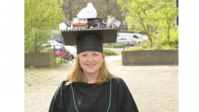 Deborah Nairn, PhD Deborah Nairn, PhDDeborah Nairn successfully defended her PhD thesis „Multi-Modality Correspondence to Enhance Arrhythmogenic Atrial Substrate Identification - Guiding Persistent Atrial Fibrillation Ablation Therapy“ on April 14th, 2022. |
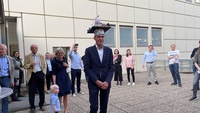 Symposium and farewell party for Prof. Dr. Olaf Dössel Symposium and farewell party for Prof. Dr. Olaf DösselAfter more than 25 years at the Faculty of Electrical Engineering and Information Technology, Prof. Dr. Olaf Dössel with a symposium on medical technology and with various subsequent celebrations in retirement. Specialist presentations by current and former representatives of the Institute for Biomedical Engineering (IBT) and the Städtisches Klinikum were followed by greetings from the KIT, Division III, professional associations, companions as well as the faculty and student council. At the celebration that followed, the IBT said goodbye to its head of institute with various musical personal contributions and with the traditional, self-made "doctoral hat". |
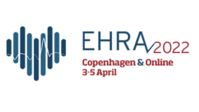 EHRA Congress 2022 EHRA Congress 2022Carmen Martinez, scientist in the IBT, presented her research results in the EHRA Congress 2022 poster sessions under the title: “Impact of contact force on local impedance measurements in different atrial locations“. The conference took place in Copenhage between the 3rd and the 5th of April. The scientific program of this year was focused on “Getting back to the rhythm!”, referring also to the recovering of on-site conferences after the pandemic. More |
 Development environment for sustainable research software Development environment for sustainable research softwareHow can the maintenance effort for research software be reduced by clever concepts and automation? The article published in the journal "Bausteine Forschungsdatenmanagement" presents ideas and solutions using the example of openCARP. More |
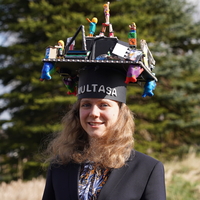 PhD Laura Unger PhD Laura UngerLaura Unger successfully defended her PhD thesis „Multimodal Characterization of the Atrial Substrate – Risks and Rewards of Electrogram and Impedance Mapping“ on February 22nd, 2022 and passed the doctoral examination with distinction. Our heartfelt congratulations! PhD thesis |
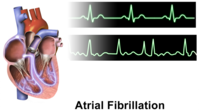 Atrial Fibrillation: Technology for Diagnosis, Monitoring, and Treatment Atrial Fibrillation: Technology for Diagnosis, Monitoring, and TreatmentA recent research topic published in the renowned Frontiers in Physiology journal highlights the latest progress in technology for atrial fibrillation diagnosis, monitoring and treatment. |
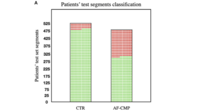 Which atrial fibrillation patients are at increased risk for heart failure? Which atrial fibrillation patients are at increased risk for heart failure?Together with physicians at Freiburg University Hospital, IBT researchers present a method to non-invasively identify those atrial fibrillation patients at increased risk of heart failure. The method is based on machine learning on the electrocardiogram. More |
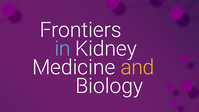 What ECG can tell us about the events on a molecular scale What ECG can tell us about the events on a molecular scaleOur research is featured in the latest episode of Renal Research Institute's "Frontiers in Kidney Medicine and Biology" in an interview with Axel Loewe. Watch the video, listen to the podcast, or read the transcript. More |
 Software Carpentry Workshop at KIT Software Carpentry Workshop at KITOn April 11th and 12th 2022, the Institute of Biomedical Engineering is hosting a workshop which aims at teaching foundational coding to researchers, open to registration for all KIT members. More |
 New research assistant at IBT New research assistant at IBTThe Institute of Biomedical Engineering welcomes Mr. Jonathan Krauß as a new research assistant. Since January 2022, he has been working in the "Computational Cardiac Modeling“ research group on electro-mechanically coupled human heart simulations. For this purpose, efficient and robust coupling schemes will be developed and evaluated. |
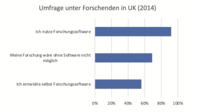 Let's to talk about research software Let's to talk about research softwareIn the days of Otto Hahn and Lise Meitner, scientific life was characterized solely by laboratory experiments, observations of nature and theoretical considerations, scientific essays and discourses. What has changed in the last 100 years? Nowadays, there is hardly a field in which research can be carried out without software. More |
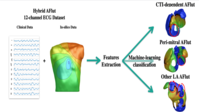 Hybrid machine learning to localize atrial flutter substrates using the surface 12-lead ECG Hybrid machine learning to localize atrial flutter substrates using the surface 12-lead ECGIBT former researcher Giorgio Luongo, PhD presented a hybrid machine learning-based classification of 12-lead ECG to discriminate between patients with three different kind of atrial flutter (cavotricuspidal-isthmus-dependent vs. peri-mitral vs. other left atrium atrial flutters). This novel algorithm may aid to identify non-invasively the best ablation procedure to terminate the arrhythmia prior to the invasive procedure in the EP labs. This work is the result of a successful collaboration between 5 engineering and clinical groups (Università degli Studi di Milano, University of Leicester, ABC Federal University, Städtisches Klinikum Karlsruhe and IBT). The paper is published in EP Europace journal and is freely available. More |
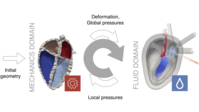 Blood flow shows minor effects on the deformation of the healthy heart Blood flow shows minor effects on the deformation of the healthy heartResearchers of the IBT and the ISTM (Institute of Fluid Mechanics, KIT) have implemented a sequential coupling approach and found that the influence of the blood flow only slightly changes the deformation of the heart wall. More |
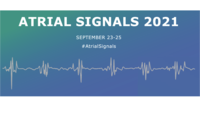 Progress - first technical, then clinical Progress - first technical, then clinicalThe international "Atrial Signals" congress took place for the fourth time in September 2021 under the patronage of the Karlsruhe Municipal Hospital (Prof. Dr. med. Claus Schmitt) and the Karlsruhe Institute of Technology (Prof. Dr. rer. nat. Olaf Dössel ) including synergy effects. More |
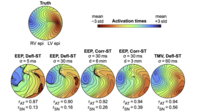 ECG Imaging improved ECG Imaging improvedThe solution of the inverse problem for ECG imaging (ECGI) is prone to detection of artifacts. A team around IBT researcher Steffen Schuler presented a method to avoid line-of-block artifacts to improve ECGI as a noninvasive diagnostic tool. More |
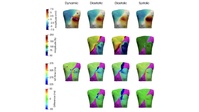 Influence of cardiac motion on the ECG Influence of cardiac motion on the ECGUsing an electromechanical computational model, researchers at IEKM in Freiburg and IBT could quantify the effect that cardiac motion has on the ECG. This work is an important basis for faster ECG simulations in the future. More |
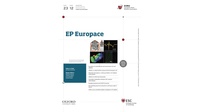 EP Europace cover story EP Europace cover storyA joint study of the University Heart Center Freiburg-Bad Krozingen and the IBT is featured on the cover page of the December issue of the renowned scientific journal "EP Europace". The study uses the ECG and ECGI to diagnose pathological changes in the atria. More |
 Axel Loewe completes habilitation Axel Loewe completes habilitationWith the colloquium "Machine Learning for Medicine and the Role of Simulated Data", Dr.-Ing. Axel Loewe qualified as a university lecturer for the field "Modeling and Simulation for Medicine". More |
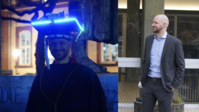 PhD Mark Nothstein PhD Mark NothsteinThe graduations season continues at IBT. We are very proud to announce that Mark Nothstein has successfully defended his PhD thesis: "Characterizing Atrial Fibrillation Substrate by Electrogram and Restitution Analysis”. Look what a nice hat his colleagues have made for him! More |
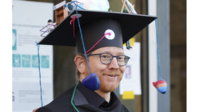 PhD Steffen Schuler PhD Steffen SchulerLast week, Steffen Schuler from our group successfully defended his thesis “Novel Methods to Incorporate Physiological Prior Knowledge into the Inverse Problem of Electrocardiography” Congratulations to our newest PhD! #phdlife #CardioTwitter. More |
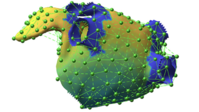 Directed Graph Mapping for Atrial Flutter Directed Graph Mapping for Atrial FlutterIBT researchers in the MY-ATRIA consortium have published a new method to better characterize atrial flutter. The approach makes use of graph-theoretical methods. More |
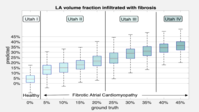 American Heart Association Meeting American Heart Association MeetingClaudia Nagel participated at the Cardiac Physiome Workshop and at the annual meeting of the American heart association. She presented her latest results regarding the influence of the ventricular shape on simulated QRS complexes in the ECG and showed that an estimation of the left atrial fibrotic volume fraction based on simulated P waves was possible with an average error of 8.7%. More |
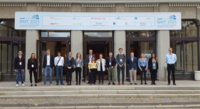 IBT at BMT IBT at BMT20 employees and students of IBT attended this year's annual meeting of the German society of biomedical engineering. 9 presentations and 3 posters from the three research groups were held and presented. Congratulations to Giorgio Luongo for winning the 2nd price for patient safety and to Hannes Welle for the 2nd place in the student competition. More |
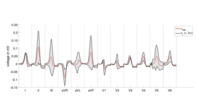 Virtual Metrology Meeting (VirtMet) Virtual Metrology Meeting (VirtMet)Olaf Dössel and Claudia Nagel participated in the first international workshop on metrology for virtual measuring instruments. Olaf Dössel held a keynote lecture about digital twins in medicine and Claudia Nagel talked about how fidelity of simulated ECGs can be assessed for a successful and meaningful application of simulated signals to clinical use cases. |
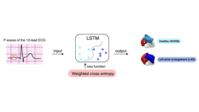 Workshop on Statistical Atlases and Computational Modeling of the Heart (STACOM) Workshop on Statistical Atlases and Computational Modeling of the Heart (STACOM)Claudia Nagel presented her work at the workshop for Statistical Atlases and Computational Modeling of the Heart (STACOM). In her presentation, she talked about an application of the bi-atrial statistical shape model developed at IBT for identifying left atrial enlargement with the 12-lead ECG. More |
 Atrial Signals conference Atrial Signals conferenceThe biannual Atrial Signals conference convened at KIT in September. More than 200 experts from both engineering and clinical communities joined discussions and presented the latest research. More |
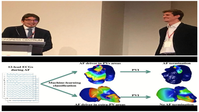 Award for Patient Safety in Biomedical Engineering 2021 Award for Patient Safety in Biomedical Engineering 2021Let's congratulate our colleague Giorgio Luongo and the whole team for winning the second prize for the patient safety in biomedical engineering 2021 with the publication “Machine learning enables noninvasive prediction of atrial fibrillation driver location and acute pulmonary vein ablation success using the 12-lead ECG”. The award was handed in occasion of the BMT 21 conference in Hannover, and offered by the German Society of Biomedical Engineering (DGBMT). More |
 New research scholarship holder at IBT New research scholarship holder at IBTWe welcome Miriam Weiß as a new research scholarship holder in the group "Optical Technologies in Medicine". More |
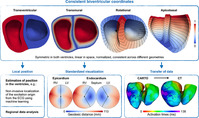 Cobiveco: Consistent biventricular coordinates Cobiveco: Consistent biventricular coordinatesIBT researchers have published an improved ventricular coordinate system for localization, data mapping and regression on cardiac geometries. An open MATLAB implementation of the method for precise and intuitive description of position in the heart is available for the community. |
 Software Carpentry Workshop at KIT Software Carpentry Workshop at KITOn October 28th and 29th 2021, the Institute of Biomedical Engineering is hosting a workshop which aims at teaching foundational coding to researchers, open to registration for all KIT members. More |
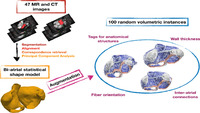 Statistical Shape Model of the Atria Statistical Shape Model of the AtriaClaudia Nagel, Steffen Schuler, Olaf Dössel and Axel Loewe published a paper on a bi-atrial statisical shape model. The model includes the anatomical shape variations of the atria in the study population and was analyzed with standard evaluation criteria. The shape model and 100 exemplary atrial geometries suitable for electrophysiological simulations are openly available online. More |
 Research Software - Sustainable Development and Support Research Software - Sustainable Development and SupportIAMO Policy Brief 42 focuses on the needs and strategies for sustainable research software practices based on a position paper. More |
 Review article on the calculation of the ECG with the help of computer models of the heart published Review article on the calculation of the ECG with the help of computer models of the heart publishedOlaf Dössel, Giorgio Luongo, Claudia Nagel and Axel Loewe have written a review article that deals with the calculation of the ECG from computer models of the heart. Both the healthy heart and simulations of various heart diseases are considered. It becomes clear how computer modeling can contribute to a better interpretation of the EKG. More |
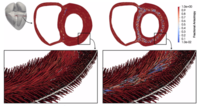 Mechanisms of hypertrophic cardiomyopathy Mechanisms of hypertrophic cardiomyopathyHypertrophic cardiomyopathy impairs cardiac mechanics but the differential effects of a thicker wall, reduced active force, fiber disarray and increased tissue stiffness are not clear. IBT researchers could elucidate their contribution to deformation, strain, strain rate and wall thickening using a computational model of the heart. More |
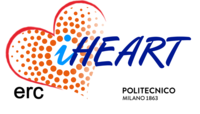 iHeart conference 2021 iHeart conference 2021During the iHeart conference from July 1-3, about 200 participants virtually presented and discussed their research. The IBT was successfully involved with two presentations. More |
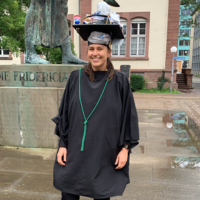 Promotion Ekaterina Kovacheva Promotion Ekaterina KovachevaOn the 8th of July Ekaterina Kovacheva completed her PhD with the title “Model Based Estimation of the Elastomechanical Properties of the Human Heart.” Congratulations from everyone at IBT. More |
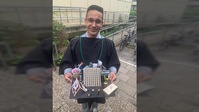 Doctorate Jorge Sanchez Doctorate Jorge SanchezCongratulations to Jorge Patricio Sanchez Arciniegas on the completion of his PhD and the beginning of his work at IBT as a postdoc. More |
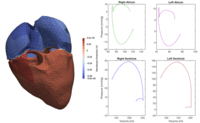 Computer Model of a personalized heart Computer Model of a personalized heartIn cooperation with the IANM (KIT) and the IEKM (University Heart Center Freiburg), researchers at IBT proposed an electro-mechanically coupled computer model of a personalized human heart. The manuscript was published in the Journal Mathematics. More |
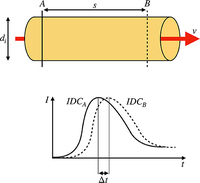 Transit Time Measurement in Indicator Dilution Curves Transit Time Measurement in Indicator Dilution CurvesResearchers at IBT investigated how accurate a transit time measurement of an indicator bolus can be and proposed methods to enhance the accuracy. The work was published in the Frontiers in Physiology . More |
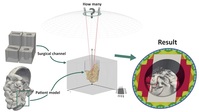 Number of cameras for the 3D reconstruction Number of cameras for the 3D reconstructionResearchers at IBT investigated how many cameras are needed so that a microsurgical operating channel can be reconstructed as completely as possible in 3D. |
| EHRA Congress 2021 A scientist of the IBT presented and discussed their research titled: “Spatial and Quantitative Assessment of the Correlation between Sinus Rhythm and Atrial Fibrillation Voltage Mapping to Identify Low Voltage Substrate in Persistent Atrial Fibrillation“ at this years EHRA congress. The congress was held online from the 23-25th of April, with this years' scientific program emphasising “Making connections to overcome arrhythmia”. |
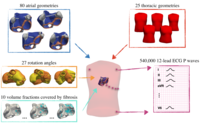 Estimation of Atrial Fibrosis with the ECG Estimation of Atrial Fibrosis with the ECGResearchers at IBT investigated whether the amount of diseased fibrotic tissue in the atria can be estimated non-invasively and quantitatively with features extracted from P waves of the 12-lead ECG. |
 Girls’ Day 2021 Girls’ Day 2021Der Workshop des IBT im Rahmen des Girls‘ Day 2021 traf auf großes Interesse des weiblichen Nachwuchses in den Bereichen Medizin und Technik. More |
 Simon Hoffmann will be research assistant at IBT Simon Hoffmann will be research assistant at IBTWe welcome Mr. Simon Hoffmann as a research assistant. His work will focus on data processing in ophthalmology. More |
 New research assistant at IBT New research assistant at IBTSince April 1st, 2021 Dr. Marie Houillon is new research assistant in the computational cardiac modeling group at IBT. More |
 Non invasive prediction of atrial fibrillation driver location Non invasive prediction of atrial fibrillation driver locationIBT researcher Giorgio Luongo and colleagues presented a machine learning-based classification of 12-lead ECG to discriminate between patients with pulmonary vein drivers vs. those with extra-pulmonary vein drivers of atrial fibrillation. |
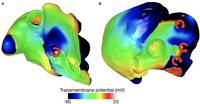 Protocol to Assess Arrhythmia Vulnerability Protocol to Assess Arrhythmia VulnerabilityResearchers at IBT showed the influence of the chosen protocol to induce arrhythmia on the assessment of atrial fibrillation vulnerability. The paper was published in Frontiers of Physiology and is freely available. More |
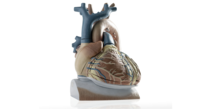 Computational hearts for success of therapy Computational hearts for success of therapyKIT's Institute of Biomedical Engineering develops, based on mathematical equations, a computational heart model to enable targeted therapy of cardiac arrhythmias. The model supports medical research and development in the fields of diagnostic and therapeutic approaches. More |
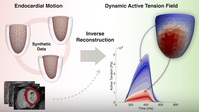 Estimating Cardiac Active Tension from Wall Motion - An Inverse Problem of Cardiac Biomechanics Estimating Cardiac Active Tension from Wall Motion - An Inverse Problem of Cardiac BiomechanicsIBT researches have published a paper, which presents a model-based method for solving an inverse problem of the heart biomechanics. More |
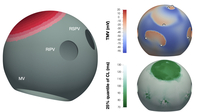 Cycle Length Statistics during ongoing Atrial Fibrillation Yield Refractory Measure Cycle Length Statistics during ongoing Atrial Fibrillation Yield Refractory MeasureResearchers at IBT showed that the statistical analysis of cycle lengths during atrial fibrillation allows to estimate refractory periods of the underlying substrate. The study combines a broad set of simulations with clinical acquisitions and was published in Europace EP. More |
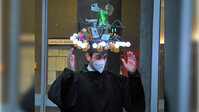 Graduation Nicolas Pilia Graduation Nicolas PiliaNicolas Pilia defended his dissertation „Electrocardiogram Signal Analysis and Simulations for Non-Invasive Diagnosis - Model-Based and Data-Driven Approaches for the Estimation of Ionic Concentrations and Localization of Excitation Origins“ on February 18th 2021 and graduated with distinction. Congratulations! |
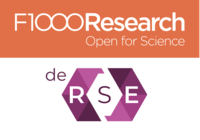 Whitepaper on sustainable development of research software in Germany Whitepaper on sustainable development of research software in GermanyThe Paper describes the environment for the development of sustainable research software in Germany, identifies challenges and calls for action. F1000Research |
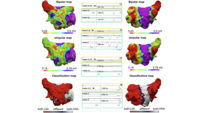 Comparison of Unipolar and Bipolar Voltage Mapping Comparison of Unipolar and Bipolar Voltage MappingIBT researches in collaboration with the University Heart Centre Freiburg have published a paper comparing unipolar and bipolar voltage mapping for localisation of atrial substrate. Frontiers in Physiologie |
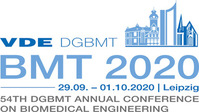 BMT 2020 BMT 2020Das IBT nimmt an der jährlichen VDE DGBMT Kongressveranstaltung teil. Mehr |
 North Baltic Conference 2020 North Baltic Conference 2020A scientist of the IBT presented and discussed his results on the simulation of the propagation of photons in a blood vessel. More |
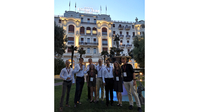 Computing in Cardiology 2020 Computing in Cardiology 2020Eight delegates represented IBT at this year’s Computing in Cardiology conference in Rimini which brought together both onsite and remote participants during the COVID-19 pandemic. More |
 Review article on the ECG-based potassium and calcium concentration estimation Review article on the ECG-based potassium and calcium concentration estimation |
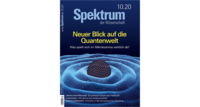 A digital heart A digital heartThe current issue of the popular scientific journal „Spektrum der Wissenschaft“, the German branch of the Scientific American, features an article of the head of the Computational Cardiac Modeling group at IBT. Under the headline „A digital heart“, Axel Loewe describes the motivation for and the basics of computational heart models and illustrates first successful examples of translation to clinical practice and clinical research. More |
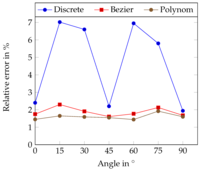 Geodesic Length Measurement in Medical Images Geodesic Length Measurement in Medical ImagesPublication of the investigation of the discretization error and its reduction in the geodesic length measurement. More |
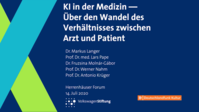 Artificial intelligence in medicine Artificial intelligence in medicineThat is the topic of the Herrenhausen Forum on July 14, 2020. The discussion with experts from IT, medicine and law was about responsibility and trust. More |
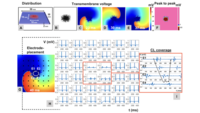 Identification of intraatrial arrhythmogenic sources Identification of intraatrial arrhythmogenic sourcesContributions by the university medical center Freiburg and IBT resulted in a paper on the identification of intraatrial arrhythmogenic sources using intracardiac electrogram characteristics. More |
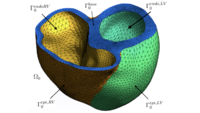 Effect of fibers and bulk modulus on the electromechanics of the ventricle Effect of fibers and bulk modulus on the electromechanics of the ventricleIn collaboration with the Politecnico of Milan, IBT presented an electromechanical model of bi-ventricular human geometries to study influences on the pressure-volume relation. More |
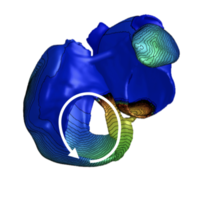 New spatio-temporal methods to characterize atrial flutter mechanisms using the ECG New spatio-temporal methods to characterize atrial flutter mechanisms using the ECGIBT researchers published two novel methods for a non-invasive atrial flutter characterization together with physicians from the University of Leicester, the ABC Federal University, and the clinicians form the Städtisches Klinikum Karlsruhe in the journal “IEEE Transactions on Biomedical Engineering”. Spatio-temporal recurrence quantification analysis methods were used to characterize and discriminate several atrial flutter mechanisms from the 12-lead ECG in a computational framework. Thanks to these methods, the duration of the invasive atrial mapping and ablation procedure might shorten significantly. The computational study was complemented and fortified by a clinical case used as a proof of concept. More |
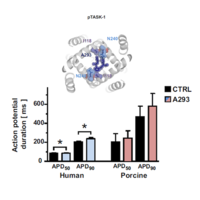 Potassium channel inhibitor A293 indicates therapeutic potential for the treatment of atrial fibrillation Potassium channel inhibitor A293 indicates therapeutic potential for the treatment of atrial fibrillationIn collaboration with the Institute of Biomedical Engineering at KIT and the University Heart Center Freiburg – Bad Krozingen, researchers from the Medical University Hospital Heidelberg published an article on the antiarrhythmic effects of A293 on cardioversion of atrial fibrillation. As a high-affinity potassium channel inhibitor, A293 mitigates the pathological shortening of the atrial action potential duration. The study indicated the therapeutic potential of A293 for the treatment of atrial fibrillation with single cell experiments, a porcine model, as well as computer simulations in a three-dimensional atrium. The open access article was published in the Journal of the American Heart Association (JAHA). More |
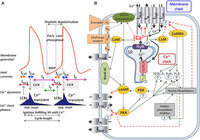 What's the role of the sodium calcium exchanger for the spontaneous beating of the heart? What's the role of the sodium calcium exchanger for the spontaneous beating of the heart?Together with researchers from the University of Szeged, IBT researchers have published a review article on the role of the sodium calcium exchanger for the activity of natural pacemaker cells. These cells are located in the so-called sinus node of the heart and make for the rhythmic beating of our hearts. The review article integrates findings from experimental studies with computational modeling. It was published in the Frontiers in Pharmacology journal and is freely available (open access). More |
 Policy paper on Research Software Engineering in Germany Policy paper on Research Software Engineering in GermanyThe collaborative opinion article "An environment for sustainable research software in Germany and beyond: current state, open challenges, and call for action" was recently published as a preprint for open peer review in F1000Research. This paper is the outcome of a workshop at the first German conference on Research Engineering and a dedicated DFG-funded follow up workshop hosted by the Robert Koch Institute. KIT and IBT researchers played a leading role in bringing together the group and coordinating the writing process. With more than 40 authors and wide community review, this grass-roots initiative calls for action to make software a first class citizen in research. More |
 openCARP released openCARP releasedopenCARP is an open cardiac electrophysiology simulator for in-silico experiments. Its source code is public and the software is freely available for academic purposes. openCARP is easy to use and offers single cell as well as multiscale simulations from ion channel to organ level. Additionally, openCARP includes a wide variety of functions for pre- and post-processing of data as well as visualization. The python-based CARPutils framework enables the user to develop and share simulation pipelines, i.e. automating in-silico experiments including all modeling/simulation steps. |
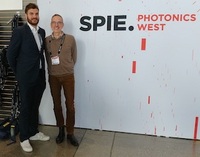 SPIE Photonics West SPIE Photonics West
Two members of the IBT attended, presented two talks and shared their results on novel segmentation methods and a 3D microscale test target at the SPIE Photonics West Conference in San Francisco on the 01st February to 06th February. The useful feedback will be incorporated in further research and contact to possible new collaborates was set. |
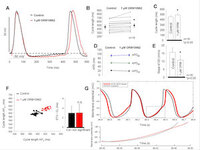 What makes the heart beat? What makes the heart beat?The sinus node is the natural pacemaker of the heart initiating each heart beat. Its pacemaking function results from the interplay of to cooperating systems: the so-called membrane clock and the calcium clock. The precise role of these two mechanisms is incompletely understood. Together with a group of experimental researchers from Szeged (Hungrary), the Cardiac Modeling group could now further elucidate the role of the calcium clock. A novel pharmacological agent allows to specifically block the sodim-calcium exchanger. IBT researcher could reproduce and further investigate this effect mechanistically in a computational model. By combining experiment and computer simulation, the crucial role of the sodium-calcium exchanger and the interplay with the membrane clock could be consolidated. The study explains how the natural pacemaker of the heart becomes robust and reliable through the interplay of the two systems calcium clock and membrane clock. More |
 Heart Simulator 1.0 Heart Simulator 1.0The issue 1/2020 of the "dotnetpro“ journal features an article about the research of the cardiac modeling group. dotnetpro delivers expert knowledge for software developers, who use Microsoft technologies to write programs for Microsoft and non-Microsoft platforms. The idea behind the article is to provide a broader view for the dotnetpro readers, who mostly are software developers. The article introduces and describes the implementation of the multiscale simulation approach (from ion channels via cells and tissue up to the organ) for electrophysiology, which is developed and used at IBT. More |
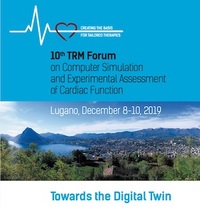 Towards the Digital Twin Towards the Digital TwinAxel Loewe from IBT was invited to present at the 10th "TRM Forum on the Computer Simulation of Cardiac Function“. The meeting brings together leading experts on computational modeling, experimental assessment, and clinical research in the field of cardiac arrhythmias. We contributed to this year’s theme „Towards the Digital Twin“ by presenting work that allows to build a biomechanical twin of an individual patient. In addition, the session "Atrial modeling & experimental data" was chaired by the IBT researcher. More |

